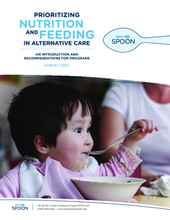INTRODUCTION
Early nutrition is fundamental for all children to grow, develop, and thrive. Proper nutrition powers children’s growth and brain development, and leads to life-long benefits in good health, better social outcomes, and success in school and work. In early childhood, and particularly in the first 1,000 days, nutrition and stimulation work together to form the architecture of children’s growing brains. Poor nutrition in early childhood can cause irreversible delays, and approximately 45% of all child deaths are related to undernutrition. Research estimates that each dollar invested in reducing stunting generates a return of up to USD $18, and nutrition for all is instrumental to delivering at least 12 of the 17 Sustainable Development Goals.
Children in alternative care, many of whom have disabilities, have some of the highest rates of malnutrition. Alternative care refers to a formal or informal care arrangement for children living without parental care. Alternative care can include family-based care such as kinship or foster care, as well as residential and institutional care. The alternative care system is responsible for identifying, preparing, and supporting children and families throughout the transition period back into family care, including biological and adoptive families. Many alternative care programs also include efforts to prevent family separation, such as positive parenting programs and efforts to reunite children with their families. If nutrition is not addressed, children in alternative care face risks from both malnutrition and the long-term stress of family separation.
Currently, an estimated 5-6 million children live in institutional care. Children with disabilities represent a significant portion of the children in alternative care overall, and are at particularly high risk of being placed into childcare institutions. Growing up in an institution is consistently associated with poor outcomes in children’s physical growth and brain development. Children who move from an institution to family-based care often catch up with some growth and developmental milestones, though delays typically persist. Both the United Nations Convention on the Rights of the Child and the Convention on the Rights of Persons with Disabilities affirm children’s rights to health, including nutrition, and to family life. The 2020 Lancet Commission on Institutionalization and Deinstitutionalization of Children calls the sector to action to provide every child with family care. SPOON’s work, and this paper, focus on improving nutrition for children during key developmental windows in all settings, and as a critical factor in accelerating progress towards ending institutionalization and providing family care for every child.
SPOON is a global nonprofit focused on equipping caregivers with the skills, tools, and information they need to respond to the nutrition and feeding needs of children in alternative care, children at risk of family separation, and children with disabilities. Our work addresses both what and how children are fed. This paper draws upon lessons from our work in 17 countries since our founding in 2008. It summarizes the main nutrition considerations for children in alternative care, and offers recommendations on integrating nutrition and feeding practices into alternative care programs. This paper also explores ways that nutrition can support the global movement to ensure every child has family-based care, while meeting the immediate needs of the millions of children currently in all types of alternative care.

